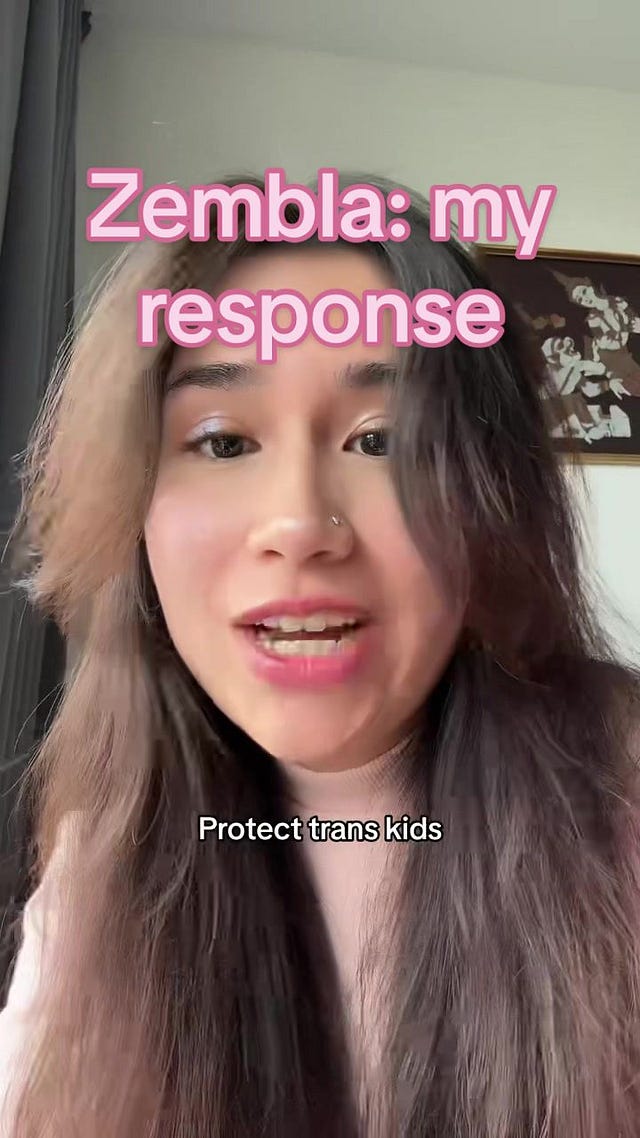What To Watch For When Invited To A Documentary On "Trans Issues"
The uptick in anti-trans documentaries is inadvertently ensnaring trans people and supporters. Here's how to stay vigilant and not be tricked into appearing in a right-wing documentary.
It's a familiar scenario: A new documentary emerges, championed by every right-wing social media account, claiming to “blow the lid off” the supposed scandal of allowing trans individuals to obtain life-saving medical care. Figures on the right and obscure interviewers craft footage with a deceitful slant. In the aftermath, trans and queer voices flood Twitter, revealing how they were misled into participating, their words warped and deceptively edited to serve an anti-trans agenda. This cycle can be broken. There are concrete measures you, your colleagues, and your friends can implement to avoid being exploited in such a manner.
Though deceptive tactics and invitations to documentaries put on by obscure companies predates trans issues, it has been used often to push for bans on gender affirming care. Matt Walsh famously employed them in order get people to participate in his “What Is A Woman” documentary. A recent Seven News documentary in Australia did the same. Just this week, we learned that a Dutch documentary brought on a Lucy Kartikasari, a detransitioner who does not feel regret over her transition. She has since released a TikTok stating that editing decisions completely changed her story to make an anti-trans point, closing off with “fuck transphobia.”
Watch her talk about her experience:
These kinds of documentaries have been foiled before. Transgender activist Eli Erlick shared an experience where she was solicited via email to speak in a documentary about “the issues facing children in the trans community.” When coordination for the interview ensued, there was a pressing insistence that she travel to Nashville, TN—a state known for its antagonism towards trans individuals. Eli evaded the trap, partly because the producer inadvertently included Robby Starbuck, a well-known anti-trans figure, in the automatic calendar invitation, exposing the ruse.
What measures should you take if you're invited to participate in an interview or documentary on transgender issues? From my experience, having accepted numerous interview and documentary invitations and declined many, I've established a set of guidelines to help gauge the legitimacy of a request:
Conduct thorough research on the producer and your primary contact. Examine their LinkedIn, Instagram, and Twitter profiles to discern any affiliations with right-wing groups. Use Google to aid your search. Also, evaluate their production history. Be wary of new studios without a track record or individuals who haven't previously engaged with this subject matter.
Inquire about their track record with LGBTQ+ reporting or topics. If they lack experience, proceed with caution. Crews that have never reported on LGBTQ+ issues are riskier than those who have covered them accurately.
Verify if queer and/or trans individuals are part of the production team. It's common for credible crews documenting trans and queer lives to include members from these communities. Given the prevalence of LGBTQ+ professionals in the film industry, an absence of such individuals on a team is a concerning sign. Ask this upfront.
Find out about other participants. It's crucial to know who else will be featured. Will the documentary give a platform to anti-trans voices, or will it represent informed voices from within the community?
Inquire about framing. Will the piece present a "both sides" argument? Reflect on the potential pitfalls of such framing. Frequently, anti-trans documentaries feature, for instance, a fringe doctor counterposed against the consensus of the American Academy of Pediatrics, attributing equal credibility to both, which can be misleading.
Reach out to a reliable contact within the industry. Feel free to ask me about the authenticity of any documentary inquiry you receive. Organizations like GLAAD and local LGBTQ+ groups can also provide valuable insight.
These tactics are valuable not only for vetting documentaries but also in other contexts. They can help you decide whether to accept an interview request, even from "respectable" news organizations. Some of these outlets, notorious for subpar reporting on LGBTQ+ matters, often cycle in journalists with little recognition to cover the topic poorly. It's crucial to confirm that you're engaging with a journalist who has a solid track record when discussing these sensitive issues.
Lately, dubious groups and right-wing documentaries have shifted their tactics. They're no longer pursuing high-profile activists, who've become adept at recognizing their ploys. Instead, they're targeting those less accustomed to such attention: local activists, healthcare professionals, and individuals outside the circles familiar with those operating in bad faith against transgender rights and care. This shift underscores the importance for all my readers to be knowledgeable about these deceptive strategies and to disseminate this awareness to their networks to prevent anyone from becoming an unwitting victim.





Recently there was a scheduled "panel discussion" that was supposed to take place in Kansas City, sponsored by PBS and another reputable organization which has put on excellent, balanced discussions in the past. However, this discussion purportedly about the effect of anti-trans legislation on local kids and families was lined up to be a debate between nationally known anti-trans speakers vs local LGBTQIA+ speakers, only one of whom is trans. We raised holy HELL and told the sponsoring organizations this is NOT the play, because of the severe anti-trans bent of the panel, and that they were about to give their reputation a big black eye, and they backed down and cancelled the event.
Thanks for this. My tactic is to refuse any press. Period. I want no part of any "documentary".